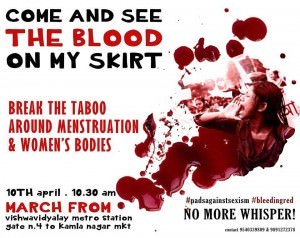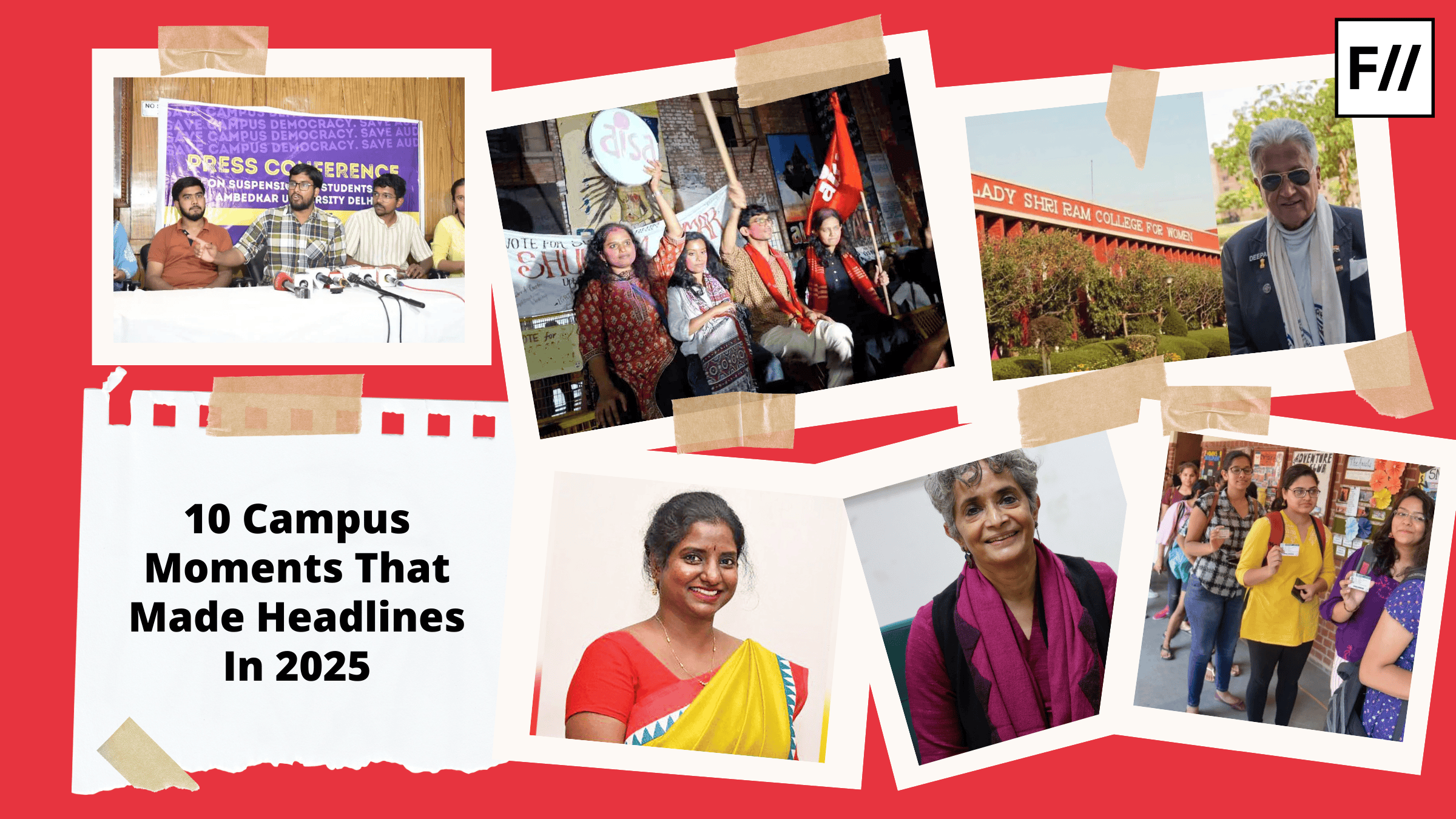When Elonë, a student from Karlsruhe, Germany, began to confront sexism in an unconventional but wonderful way and used sanitary pads as her weapon, she had no idea how far and deep the #PadsAgainstSexism movement will stretch.
“I thought about how society gets offended by a normal pad. I thought about it so much, the idea came to me to write quotes on them,” she says. So she did.
Students of Jamia picked it up and began to stick sanitary pads with feminist messages on them all across the campus. Some of the messages read:
“Period blood is not impure, your thoughts are.”
“Menstruation is natural, rape is not.”
“Streets of Delhi belong to women too.”
“Rapists rape people, not outfits.”
“Kanya Kumari, Gandi soch tumhari.”
From there, it was just a matter of time and the movement spread to JNU and DU as well. But as the university authorities like to play the devil’s advocate, the pads were torn down by the administration and Jamia students were issued show notice cause by the Proctor.

In light of this, Come And See The Blood On My Skirt, a protest was organised on 10th April 2015 at North Campus, DU which saw a mix of students and activists from JNU, DU, Jamia and other universities as well. In their own words, the idea behind this march was to take forward some issues which included breaking the silence and taboo around women’s menstruating and sexual bodies. By bringing these hitherto hushed up questions into the public domain the march was as a symbolic initiative to open the larger questions of repressed sexualities, unpaid reproductive labour, unavailability of free and sustainable menstrual and sexual health care for all women, appropriation of women’s bodies by patriarchy and capitalism.
The protesters gathered around 10:30 AM at Vishwavidyalaya metro station. With colorful posters everywhere and enthusiastic slogans all over them, the protest started with songs of freedom and love defining the very need of freedom in issues relating to sexual and menstrual health, songs that echoed thousands of suppressed voices, hushed voices inside bedrooms, bathrooms and clinics. A crowd of at least 45-50 people walked the entire 4 hours, and another fleeting 40 people joined and left at different points. The protest had a visual aesthetic which attracted people wherever they stopped, people would be curious. Then the protesters started walking from the metro station towards Khalsa college owning the streets with loud slogans and blood-y songs. The walk saw heavy enthusiasm among protesters and students on the roads. At Khalsa college, one could hear slogans and songs like:
“Khalsa ke sathiyo saath do”
“Baabu tera taboo Nahi chalega”
“We want free pads, free lives, free sexuality, free reproductive health”
“Aaj kal tere mere period ke charche har zubaan par”
“Jab bleed kiya to darna kya”
“Khoon dekh le, tu mera khoon dekhle”
Pamphlets were distributed among the Khalsa students. From Khalsa, the march began towards Miranda house, where sadly protesters couldn’t enter, highlighting the fact that even in a women’s college, menstruation is still among many disturbing taboos prevalent in our society. There was an attempt made to open the gates but we faced strong opposition from security guards. Disappointed with Miranda’s case, the protesters marched forward towards Ramjas college, where again they were not allowed to enter the premises. But they succeeded in Arts and Law Faculty, Kirori Mal, Kamla Nagar and finally D-school.
Many of the girls shared their personal experiences related to menstruation, from embarrassing instances to really disturbing memories. These women found an open platform to share their deep seeded thoughts about periods and how they felt facing several issues when they were young.One of the speakers also spoke about her PCOS situation, which is quite normal and happens to every third woman. So there are also cases when women don’t bleed at all or once in a while, all these issues are not discussed in public and are mostly hidden as some bad or sick disease.
No more Whispers!
No more Murmurs!
No More Silences!
Its time we scream!
Come and see the blood on my skirt.
Come and see the blood on my skirt….
One of the speakers also spoke about her PCOS situation, which is quite normal and happens to every third woman. There are cases when women don’t bleed at all or once in a while, all these issues are not discussed in public and are mostly hidden under the guise of bad or sick diseases.
The whole issue of universalize menstrual care was quite dominant in the slogans and people’s speeches and targeting companies for profiting on menstrual needs of women. Although pads were constantly mentioned in slogans, people also talked about the need for “sustainable” alternatives to menstrual care, like the menstrual cup. There is a huge issue with disposal of sanitary pads both in terms of ecology and conditions that waste pickers have to deal with.
This march is not going to end the taboo, it’s a beginning, an experimentation with a certain form. One hopes there will be various methods and forms one adopts to have these difficult conversations that need to be had for confronting socialisation.
With major inputs from Deepti Sharma, Garima Sharma, Anshita Dawar and Devangana Kalita
About the author(s)
Japleen smashes the patriarchy for a living! She is the founder-CEO of Feminism in India, an award-winning digital, bilingual, intersectional feminist media platform. She is also an Acumen Fellow, a TEDx speaker and a UN World Summit Young Innovator. Japleen likes to garden, travel, swim and cycle.



